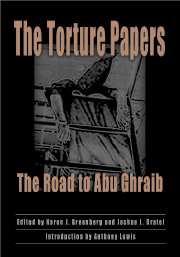Introduction
Published online by Cambridge University Press: 05 June 2012
Summary
The Torture Papers: The Road to Abu Ghraib includes the full texts of the legal memoranda that sought to argue away the rules against torture. They are an extraordinary paper trail to mortal and political disaster: to an episode that will soil the image of the United State in the eyes of the world for years to come. They also provide a painful insight into how the skills of the lawyer – skills that have done so much to protect Americans in this most legalized of countries – can be misused in the cause of evil.
We have the legal memoranda because committed reporters, from The Washington Post and others in the press, ferreted them out – until, finally, the government released official texts. Without the press, indeed, the whole torture episode might have remained hidden. The television program Sixty Minutes and Seymour Hersh, in The New Yorker, told the world what had gone on in Abu Ghraib and showed us the pictures. They relied on the unchallengeable findings of an inquiry by Major General Antonio M. Taguba into the conduct of a military police brigade in Iraq. The Taguba Report, too, is in The Torture Papers.
The mindset that produced the legal memos is easy enough to see. After the terrorist attacks of September 11, 2001, the Bush Administration reasoned that the United States was up against an enemy more insidious than any the country had faced.
- Type
- Chapter
- Information
- The Torture PapersThe Road to Abu Ghraib, pp. xiii - xviPublisher: Cambridge University PressPrint publication year: 2005
- 3
- Cited by



